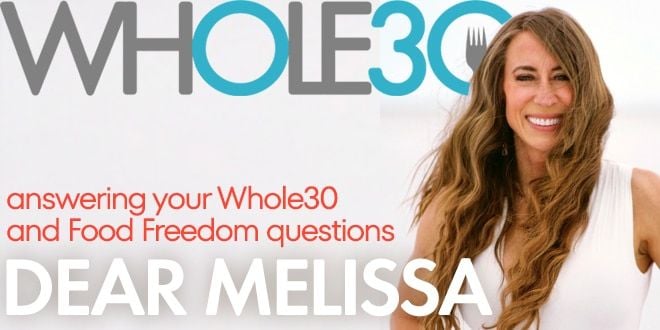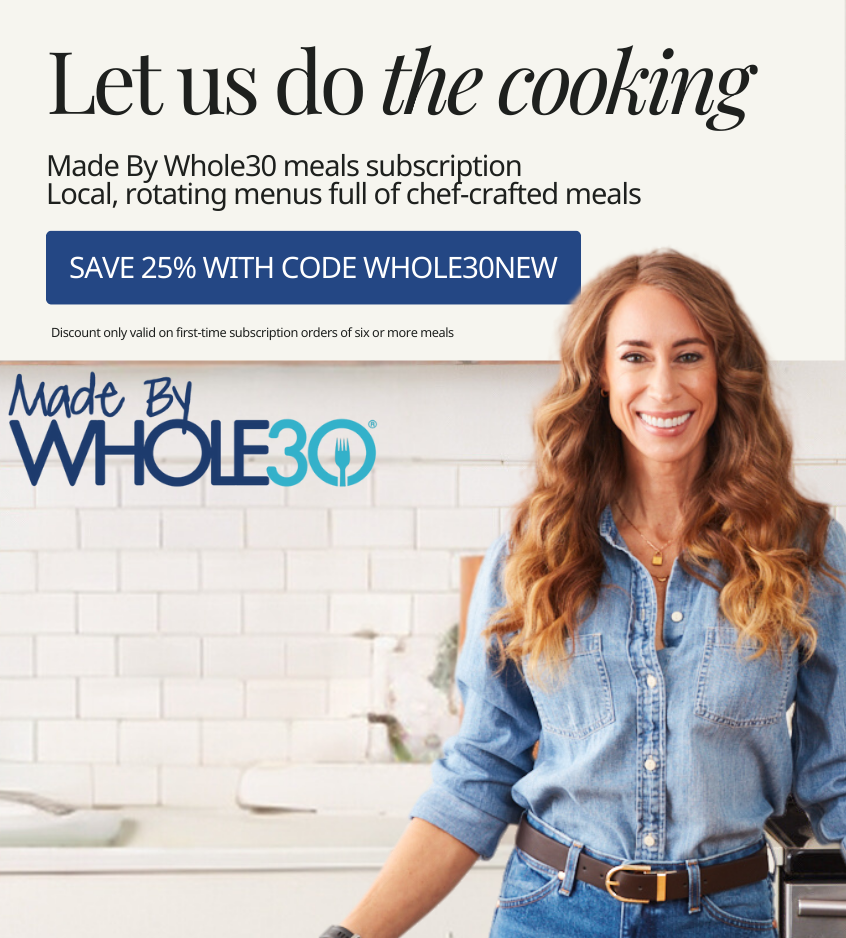You learn so much about your relationship with food, and your habits around food during your Whole30. There were plenty of times you learned to cope with stressful situations during those 30 days without diving into emotional eating. Using food as self-care during times of frustration, stress, or anxiety is common. But you can use what you learned during your Whole30 to curb emotional eating and help you better deal with stress in your Food Freedom—and your life in general.
Using food as your primary—or sometimes only—coping mechanism is learned behavior. It’s modeled by the adults around us when we were growing up and advertised to us on television and in magazines. Emotional eating is also socially acceptable (encouraged, even, in today’s #treatyourself culture), and because we’re all doing it, nobody has to question whether or not it’s in our best interest. Most importantly, coping with food or drink is so prevalent because on top of all of those factors, it’s easy. These items are often cheap, readily available, and designed to make us crave and over-consume them. That perpetuates the habit cycle of stress -> crave -> over-consume (which leads to more stress).
No wonder we reach for the ice cream when we have a break-up, prowl the pantry when we’re feeling lonely or anxious, or habitually pour a glass of wine after a long day of work. We’ve been modeled this coping mechanism our whole lives, it’s been marketed to us as both helpful and normal, and it’s far easier than sitting with our discomfort and unpacking what’s underneath them.
Food Can Be Love
I want to emphasize this: I don’t believe using food as comfort, self-love, or to self-soothe is “bad.” Nor do I believe we should never use food in that manner. I still seek specific foods I love, like potato chips, ice cream, or cheeseburgers with the bun, deliberately and with much delight and joy when I’m feeling down, anxious, or just need an afternoon of self-care. (Yes, I still use food as self-care, and yes, I feel fantastic about that!)
However, it can become problematic when food and emotional eating is our only source of comfort, self-love, or self-soothing. Or if we use food to automatically numb, distract, or distance ourselves from our feelings and needs. If we don’t learn to sit with the discomfort of negative emotions and fail to create other strategies for exploring how we feel, relieving stress, and showing ourselves care, our habits and emotional relationship with food can spiral into unhealthy territory. And this may lead to negative physical consequences, too.
Most people come to the Whole30 with the hope of changing their habits and relationship with food. And the program is designed to help you do just that, using the science of an elimination diet and a foundation of habit research. But now that your program is over, you want to continue to learn, create, and explore other strategies for stressful situations, so that food becomes just one of those tools in a broad, colorful, diverse tapestry of skills, plans, and strategies you’ve developed.
So what else can you do in the face of stress, anxiety, frustration, and anger? There are a number of answers, and your solutions will be unique to you, but in my experience, they all have one underlying theme in common … connection.
Cookie vs a Connection
When I am feeling overwhelmed and alone—disconnected from myself, my friends and family, my emotions, or my environment—it’s easy for me to isolate. And being alone in my space and feelings makes it all too easy to slip into habits that don’t serve me—including overindulging in emotional eating. What I’m usually looking for in moments of discomfort, stress, or anxiety is to connect, process, and move forward in a healthy way.
The first step is to identify what kind of connection you need in this moment, and gift that to yourself. Some examples:
- I’m way angrier at this than I should be. I need to calm down and give myself some space to explore what’s underneath this. I’m going to rage-clean until I feel more calm/go for a long walk/take a hot bath. (Connecting with yourself.)
- This situation sucks, so I need to be extra-nice to me right now. I’m going to put on some good music and prep a nourishing meal/buy myself flowers/put my phone away for the night and read a good book. (Connecting with yourself.)
- This feels overwhelming. I need someone to help me break it down into bite-sized pieces and lend me some support. I’ll call/visit/text my friend/mom/partner/therapist. (Connecting with others.)
- I’m still frustrated and down and can’t seem to snap myself out of it. I’ll join a friend for yoga/ask my spouse if they’ll go for a walk with me/meet my coworkers for happy hour; sparkling water and lime, please! (Connecting with others.)
- I’m so frustrated and angry, and I need an outlet to express that. I’m going to the gym/hitting the trail for a run/spending the next 30 minutes free-journaling. (Connecting with your emotions.)
- I’m feeling some big stuff and I don’t know where it’s coming from. I’m going to meditate/check in with my body from a place of curiosity not judgment/ask my spirit guides/the universe/god for help. (Connecting with your emotions.)
How to Connect and Avoid Emotional Eating
I learned during my first Whole30 that talking to someone about the situation and how I’m feeling should always be my first go-to. Saying things out loud always puts them in perspective for me. In your head, it can sound SO big and overwhelming, but when you say it out loud, the hard things, shameful things, or anxious things often lose some of their power.
Also, you deserve to feel supported and know that you’re not alone. Your conversation partner may be able to actually help with practical advice or assistance, but at the very least, they will show you empathy, listen to you process out loud, or just give you a big hug and tell you that it will be okay and that they’re here for you, which can shift your energy out of feeling overwhelmed and back into empowered. In-person social interactions can be a huge modulator of stress, so if you have the option of grabbing coffee, going for a walk, or meeting during a work break, choose that over a phone call or text message (although those can help too). To level up your mental health even more, spend time moving your body and/or outdoors, letting those green spaces, sunshine, and endorphins that can come with movement boost your mood too.
Therapy is also hugely helpful here, as a trained therapist can help you untangle your feelings or unpack what’s underneath them. Online support groups or forums, subscriber-only communities (that feel safer than general social media spaces), or in-person meetups can also provide guidance, support, and encouragement around specific issues or life circumstances.
Finally, there are solo practices that can help you feel more connected to your body, emotions, needs, and higher power (whether that’s God, the Universe, or your highest consciousness). You can find free guided meditations that can help you get in touch with your feelings somatically, walk you through reparenting exercises, or project loving kindness to yourself and others. Journaling is another great practice, whether you write a letter that never gets sent, follow prompts from a therapist or self-help book, or simply free-write how you’re feeling in the moment.
Healthy Habits That Last a Lifetime
As you continue to work your Food Freedom plan, you’re going to encounter situations that leave you feeling anxious, lonely, stressed, or angry. Leaning on what you’ve learned from your Whole30 experience, actively committing to your Food Freedom plan, and continuing to practice other ways to comfort, love, reward, and support yourself will help you create new, healthy habits that last for the rest of your life. Food can be a part of that toolbox, but I encourage you to actively fill that box with a variety of strategies as well.















